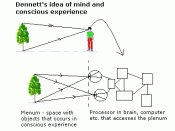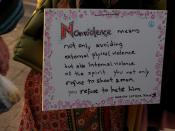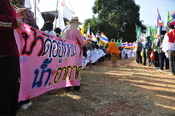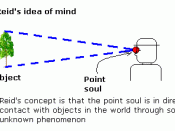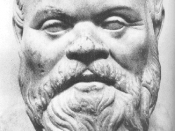However great the oppression of humankind, there will always be instances of rebellion, times when the inestimable rage of the denigrated, the dispossessed, the downtrodden will boil over in a peremptory defiance directed, if not always focused, against a world that denies them their humanity so that others might aspire to a semblance of humanity. In whatever form it takes, this rebellion is a reaffirmation of the dignity denied them by the world. It is achieved by force -- the force of will, the power of a being at once realizing and taking possession of itself. It is realized in the assertion of oneself, not by seeking control, but simply in taking control over the circumstances of one's life, effecting change, however small, in the world around oneself, realizing the profound effect a single person can have on others, on the world, with but the slightest of actions.
. . .The soil of rebellion is the mind; it is there that the idea is given life; it is there that the idea takes hold. Every person reaps a different harvest. The idea roots itself in the mind and projects its limbs outward to the world where it bears its fruit. If the strength of will, the sense of purpose, the recognition of oneself dies, so too does the idea. It becomes a life unfulfilled, a dream unrealized, a revolution crushed; the once stout limbs recede and crumble, the flowers shrivel, their colors bleed away, the fruits fall prematurely and decay -- to rot, to die slowly in a sterile soil, permeated by the putrid stench of death, a feeding ground where the parasites of morality come to drink deeply, to consume, to siphon the energy that gives them life.
. . .But some ideas thrive, nourished by a rare and so all the more brilliant strength of will and sense of purpose which give rise to an idea that cannot be denied, that cannot be destroyed, that cannot be controlled -- berated, it yet grows in confidence, vilified, it becomes all the more beautiful, assailed, it yet pushes forward, into a contrived reality that resists it with all the illusions of ages, which shatter and dissolve in its overwhelming presence.
. . .To change the world is to change the ideas in the minds of men and women, to cultivate the soil and allow ideas to spring from the dignity and power of humanity, each idea a reflection of, not only the life which gave it birth, but also of the lives to which it gives birth.
. . .So we might ask, a bit playfully at first, How do you change the world? It seems such a naive question, asked by someone lost in a hopeless, deluded, puerile optimism.
. . .But it is not so naive. Changing the world is not so difficult. It needs only passion, resolve -- sometimes an irrepressible fury.
. . .Then the world can change with but a simple glance.
A gaze, pierces the haze and sets it all ablaze . . .The difficulty is not in changing the world. The ripples even of daily life have consequences beyond imagination. The difficulty lies in the change itself, in determining what reality to create and, perhaps more importantly, the tools used to create it -- the tools in which we find ourselves, our goals, where we find slumbering the world we seek, waiting only for someone to awaken it. The difficulty is control, focus, in realizing and harnessing our power without destroying the world we seek to create, in creating life without destroying it.
. . .The tool is non-violence, but a non-violence of amazing power, a non-violence that shatters nearly every boundary, a non-violence that regally dismisses the heavy shackles the world seeks to place upon it. It is a non-violence of remarkable insight, piercing the illusions, crashing effortlessly through the fanciful barriers erected by all the systems and structures people use to enslave themselves. It is a non-violence of force, using every means to destroy ideas without crushing people. It is an approach that is part of a larger philosophy, a system of knowledge and thought and feeling which gives rise to an overwhelming power that is channelled and focused, to be turned, not upon the lives of human beings, but upon the ideas, systems, structures in which those lives find meaning -- destroying what destroys life, elevating that which elevates life.
. . .This approach must be rooted in uncompromising passion and resolve, assisted by keen insight, and, most importantly, commanded by a mind unleashed, a mind that holds, not the symbol, but the substance sacred. Humanity, life is, for it, the greatest and perhaps the only ideal. For such a mind, law does not exist as we have known it -- it is nothing more than what that mind determines would, at any given moment, lend greater meaning to and illustrate greater respect for the inherent, ineffable dignity of life.
. . .If that means destroying what masses of ignorant minds consider sacred, then so be it.
. . .It is not, by definition, a half-baked approach. It may entail much risk and sacrifice, yet that makes it all the more powerful -- for when it strikes, it strikes not only at a single illusion, but at the entire structure, the very fabric of a contrived reality, shrewdly, even deviously taking advantage of every weakness, and turning every strength of that which it assails into a crippling handicap. It strikes with an unexpected, unimaginable force, one not purely physical since the implement of destruction held in the hand is seemingly innocuous -- veiling, within one person, with no obvious weapon in hand, the most sophisticated army conceivable. It strikes with a force all the more powerful because it knows that the structure will not fall, toppling to leave a mass of destruction in its wake, but will simply disintegrate and fade away, being nothing.
. . .In method it often engages in guerrilla warfare, hides behind a soothing veil of seeming innocence and, when the time is right, bares its teeth in a lightning flash, strikes hard, strikes fast, then recedes, fades away, once again to don its mask. It is an impudent changeling, the greatest confidence engendered by a surface which harbors beneath it the seeds of change, silently pulsating, waiting for a moment of explosive growth.
. . .It hides everywhere, knowing the fanciful intricacies of systems that do not know themselves. With superior understanding it slips through every crack, makes larger every hole, effortlessly subverts, creates disarray, havoc, chaos, and all dissolves into a silent, awe-inspiring calm -- not the silence of the battlefield now a graveyard, not the silence of death, rather the silence of calm awareness, the silence of life awakening, opening its eyes and taking hold of itself.
. . .Beneath a calm exterior lies amazing passion and force of will, torrents of emotion and fury, an energy that cannot be resisted. Only in the eyes does one observe the ingenious, secret designs, the gleam of intelligent rebellion and a resolute, unassailable confidence -- a terrible aspect that reflects to the world the inevitability of a future decided upon and being engineered by the power of even a single mind.
